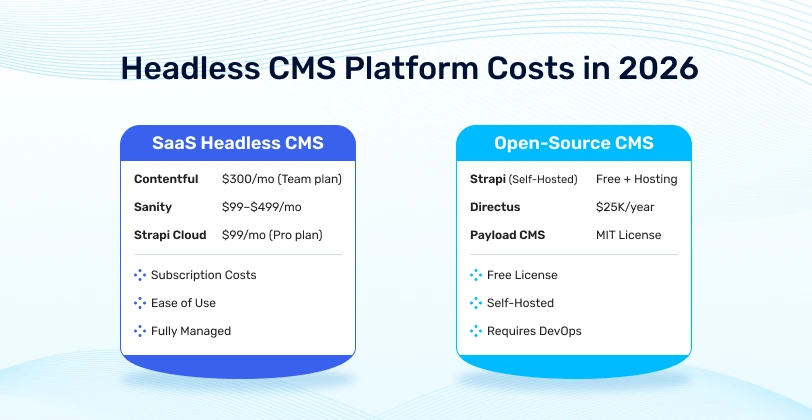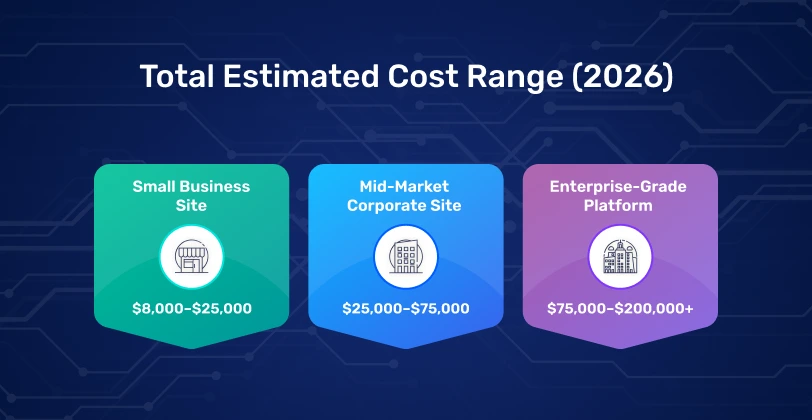Select Your Region
Region-Based Optimized Content
How Much Does It Cost to Build a Headless CMS Website in 2026?
Explore the 2026 cost breakdown for building a website using a headless CMS. Understand expenses for CMS platforms, custom frontend development, hosting, and maintenance.
Headless CMS architectures continue to redefine modern web development, offering flexibility, scalability, and performance benefits. But as businesses evaluate whether to adopt this approach, one critical question arises: How much does it cost to build a website with a headless CMS in 2026? The answer depends on multiple factors, from platform selection to development complexity. Here’s a detailed breakdown of the costs involved.
Understanding the Core Cost Drivers of a Headless CMS Website
A headless CMS decouples the content management backend from the frontend presentation layer, allowing developers to use any framework (like React, Next.js, or Vue.js) for the frontend. This separation introduces unique cost considerations:
CMS Licensing & Subscription Fees: SaaS-based headless CMS platforms charge monthly or annual fees, while open-source options require self-hosting.
Frontend Development Effort: Building a custom frontend requires more developer time compared to traditional CMS templates.
Hosting & Infrastructure: Depending on the stack (Jamstack, serverless, or hybrid), costs can vary significantly.
Integrations & APIs: Connecting third-party services (e.g., eCommerce, CRM) may involve additional development and subscription costs.
Ongoing Maintenance: Updates, security patches, and performance optimizations contribute to long-term expenses.
Headless CMS Platform Costs in 2026
 Headless CMS platforms typically fall into two categories: proprietary SaaS solutions and self-hosted open-source options. Here’s a comparison of popular platforms:
Headless CMS platforms typically fall into two categories: proprietary SaaS solutions and self-hosted open-source options. Here’s a comparison of popular platforms:
1. Proprietary SaaS Headless CMS (Monthly/Annual Plans)
Builder.io: Starts at $49/month (Basic plan), with advanced plans (Business/Enterprise) ranging from $149/month to custom pricing based on usage and integrations.
Sanity: Pay-as-you-go pricing based on API calls, averaging $99–$499/month for mid-sized sites.
Strapi Cloud: Starts at $99/month (Pro plan) with higher tiers for advanced features.
2. Open-Source Headless CMS (Self-Hosted)
Strapi (Self-Hosted): Free to use but requires hosting (e.g., AWS, DigitalOcean) and DevOps oversight.
Directus: Open-source with optional enterprise support starting at $25,000/year.
Payload CMS: MIT-licensed, but custom deployments require infrastructure setup.
Cost Consideration: While open-source options eliminate licensing fees, businesses must budget for server costs, security, and maintenance—typically $50–$300/month for a small to medium-sized site.
Platform (Web, Android, iOS, Cross-Platform)
Another major factor influencing the cost of a headless CMS website in 2026 is the platform choice. Where your software will live directly affects development time, complexity, and overall expenses.
Web-Only Applications: Building for the web alone is usually the most cost-effective since you only need one frontend layer.
Native Mobile Apps (iOS & Android): Developing separate versions for iOS and Android increases costs, as each requires its own development and maintenance cycle.
Cross-Platform Development: Frameworks like Flutter or React Native allow developers to write code once and deploy across multiple platforms. This approach saves costs and accelerates time-to-market, but can come with trade-offs in terms of performance and deep native integrations.
| Platform Type | Average Cost Range (USD) |
|---|---|
| Web App | $15,000-$60,000 |
| Android or iOS | $20,000-$80,000 |
| Both (Native) | $40,000-$150,000+ |
| Cross-Platform | $25,000-$90,000 |
Frontend Development Costs
Unlike traditional CMS themes, headless websites require custom frontend development. Here’s what influences the cost:
Framework Choice: Building with Next.js or Gatsby may cost $5,000–$20,000 for a mid-complexity site, depending on agency rates.
Custom UI/UX Design: Unique designs add $3,000–$15,000+ based on complexity.
Developer Expertise: Hiring a specialized Jamstack developer averages $80–$150/hour.
Example: A marketing website with blog functionality, built on Next.js and Contentful, might require 100–200 development hours, totaling $8,000–$20,000.
Hi, my name is Jaswinder, let's talk about your business needs.
I will do my best to find a reliable solution for you!
Hosting & Infrastructure Expenses
Headless websites often leverage modern hosting solutions like:
Vercel: Starts free (hobby tier), with Pro plans at $20/month and enterprise-grade scaling.
Netlify: $19/month (Pro) with advanced features like form handling.
AWS Amplify: Pay-as-you-go pricing, averaging $10–$100/month for low-to-medium traffic.
For high-traffic sites: Global CDN costs, serverless function invocations, and database usage (e.g., Firebase, Supabase) can push hosting to $200–$1,000+/month.
Additional Costs to Consider
Beyond the basics, these expenses may apply:
Third-Party Integrations: CRM (HubSpot), eCommerce (Shopify), or payment gateways may require additional subscriptions.
Content Migration: Moving from WordPress or another CMS costs $2,000–$10,000 depending on data complexity.
SEO & Performance Optimization: Advanced caching, image optimization, and SEO plugins add $500–$3,000+.
Cost Breakdown by Region: Offshore & Onshore Development Rates
When estimating the budget for a headless CMS project, regional development rates play a significant role. The hourly cost of hiring developers varies widely based on location, expertise, and market demand. Many businesses weigh the pros and cons of onshore vs. offshore development to balance quality, cost, and communication efficiency.
Onshore Development (U.S., Western Europe): Typically more expensive due to higher living costs and established tech markets. U.S. developer rates are among the highest globally, reflecting advanced expertise, strong infrastructure, and higher labor costs.
Offshore Development (Eastern Europe, Asia, Latin America): More cost-effective while still providing access to skilled talent. Countries like India and Ukraine are well-known for offering competitive rates without compromising technical proficiency.
| Region | USD/hr |
|---|---|
| Dubai (UAE) | $50 – $70 |
| United States | $40 – $60 |
| Canada | $35 – $55 |
| Germany | $40 – $60 |
| India | $15 – $25 |
Total Estimated Cost Range (2026)
 Based on the above factors, here’s a rough estimate for different project sizes:
Based on the above factors, here’s a rough estimate for different project sizes:
Small Business Site: $8,000–$25,000 (basic CMS, simple frontend, low-traffic hosting).
Mid-Market Corporate Site: $25,000–$75,000 (custom design, integrations, medium-scale hosting).
Enterprise-Grade Platform: $75,000–$200,000+ (multi-region deployment, high availability, advanced DevOps).
Understanding Developer Charges: Freelancers, Agencies & Experience Levels
When budgeting for a headless CMS website, costs depend on who you hire and their experience. Freelancers charge less but require more project management, while agencies provide full teams and quality assurance at higher rates. Developer rates also vary by level: Junior developers are affordable but need supervision, Mid-level balance cost and expertise, and Senior developers command premium rates for advanced skills and faster delivery.
| Type | Junior Developer | Senior Developer |
|---|---|---|
| Freelancer | $15 – $25 | $25 – $40 |
| Small Agency | $25 – $40 | $40 – $60 |
| Large Agency / Enterprise | $40 – $60 | $60 – $90 |
Note: The costs mentioned in this guide are average estimates based on current industry trends in 2026. Actual expenses may vary depending on project requirements, platform usage, customization level, developer rates, and market conditions. Pricing can fluctuate over time, so always consult with a development partner for an accurate and up-to-date quote.
Frequently Asked Questions
Find answers to the most common questions about How Much Does It Cost to Build a Website with Headless CMS
Initial development costs are higher due to custom frontend work, but long-term scalability and performance benefits often justify the investment for growing businesses.
Yes. Some platforms like WordPress + Frontity or Shopify Hydrogen allow a gradual transition, blending traditional and headless features at a lower initial cost.
Ongoing API usage fees (for SaaS CMS) and developer maintenance for self-hosted solutions. Always model long-term expenses, not just setup costs.
Integrating platforms like Shopify or BigCommerce adds 10–30% to development costs due to cart, checkout, and inventory API complexities.
News & Insights
We like to share our thoughts on topics we find inspiring. Explore our news and insights.
Building a Headless Commerce Backend with Strapi + Shopify API
Discover how integrating Strapi with Shopify API enables a headless commerce backend, offering flexibility, scalability, and seamless multi-channel e-commerce experiences.
Why Logistics Businesses Need a Custom Mobile App in 2026
In 2026, logistics businesses must adopt custom mobile apps to manage drivers, track deliveries in real time, optimize routes, improve communication, and scale operations efficiently.